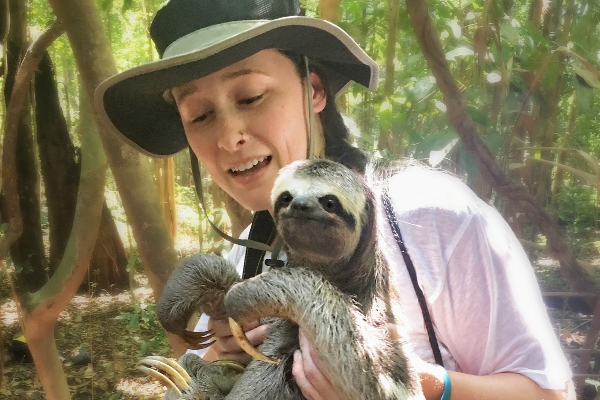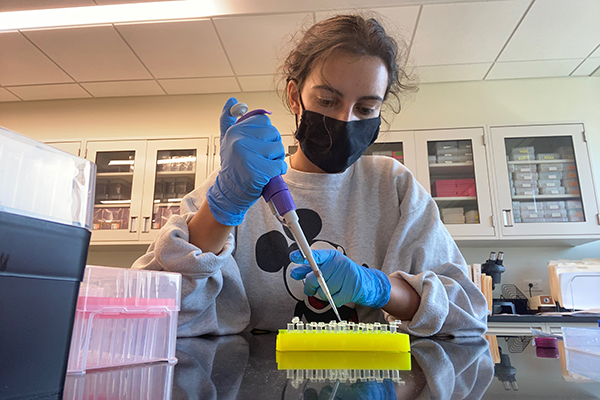High-impact learning happens when students are actively engaged in the educational process and their experience expands beyond the classroom and is applied in their personal and work lives. High-impact learning provides hands-on experience and the ability to work closely in a diverse setting. Students engaged in high-impact learning often see improvement in grade point averages and are more involved in their education.
Education Abroad
ECCB offers several Education Abroad programs where students travel to the Caribbean, the Amazon, and South Africa with ECCB faculty to engage in exciting exploration adventures where they experience other cultures and environments. ECCB works to keep these programs affordable by subsidizing a portion of the trip cost and offering direct scholarships to eligible students who apply. These scholarship opportunities are advertised by email to students each fall and spring.

Undergraduate Research
Hands-on research experience is critically important for the future careers of undergraduate students in ecology and conservation biology. ECCB provides a diverse array of research opportunities for interested undergraduates. Interested students may directly apply to the faculty member offering the research experience.
ECCB may have funds available to award undergraduate research mini-grants to eligible students conducting undergraduate research. This funding opportunity is advertised by email to ECCB faculty and students each fall and spring when funding is available.

Internships
Internships are an important experience for all students. While course credit may not be available, internship experiences are highly recommended for all students. Internships provide a realistic view of what a career in ecology and conservation biology entails. Student interns gain practical, hands-on knowledge and experience. Internships provide an opportunity for students to network with career professionals and build valuable relationships as students prepare to embark on their professional careers.
Find Your Community
With more than 1,000 student groups, you are bound to find an organization to help you get connected. Visit Texas A&M’s Maroon Link to see a comprehensive list of current student groups. There are several student organizations available for our students to get involved in. Student organizations enable students to develop professionally, expand own personal growth and knowledge, and enhance leadership skills, all while providing networking opportunities with other students. For more information on a specific organization, select the link below.
Course Field Trips
Field experience is a critical component of an undergraduate degree in ECCB. ECCB offers several courses with labs and field trips that give students the necessary hands-on learning experience in the field. A few example course field trips may be found below.
| Course Number | Course Title | Typical Locations | Activities |
|---|---|---|---|
| ECCB 203 | Forest Trees of North America | Castle Rock Park, College Station, TX | Observation of trees |
| ECCB 215 | Fundamentals of Ecology–Laboratory | Lick Creek Park, College Station, TX | Field sampling /observations of plants and animals |
| ECCB 301 | Diversity and Evolution of Plants | Madisonville, TX | Conduct botanical surveys and collect research-grade plant specimens. |
| ECCB 311 | Ichthyology | San Jacinto River, Conroe/Brazos River, Navasota River, | Ichthyological sampling (seine nets, dip nets, backpack electro shocker) |
| ECCB 314 | Down River: Biology of Gulf Coast fishes | Guadalupe River, from headwaters to delta | Ichthyological sampling (seine nets, dip nets, backpack electro shocker) |
| ECCB 316 | Field Herpetology | Port O’Connor, TX | Teach techniques to find and capture reptiles and amphibians in their natural habitat. |
| ECCB 319 | Principles of Forestry | Cook’s Branch Conservancy, Montgomery, TX | Observation of the demonstration plots of forest managed with prescribed fire |
| ECCB 324 | Forest Measurements | Forests in Huntsville, TX | Forest measurements |
| ECCB 325 | Field Studies in Forest Ecosystems | Davy Crocket National Forest, Kennard, TX, Fairchild State Forest, Jacksonville, Forests in Huntsville, TX | Forest inventory and analysis Observation of forests in private and public lands |
| ECCB 402 | Ornithology | Ecology and Natural Resources Teaching Area, College Station, TX | Field identification techniques, building skills used in ornithological careers, including point-count surveying and list keeping. |
| ECCB 405 | Forest Resource Assessment and Management | Forests in Huntsville, TX | Visit 3 forest tracts to develop forest management plans |
| ECCB 417 | Prescribed Fire | Wildland-Urban Interface, College Station, TX | Participate in field-based activity in Texas grassland ecosystems and wildfire risk. |
| ECCB 420 | Ecological Restoration of Wetland and Riparian Systems | Discovery Center in San Marcos, TX Padre Island National Seashore | Visit San Marcos to see how the city manages and restores their parks and wetlands. |
| ECCB 460 | Nature, Values, and Protected Areas | Padre Island National Seashore | Meeting with park staff and learning about management and conservation issues. |

Down River: Biology of Gulf Coast Fishes
ECCB 314/614
Every summer, ECCB Associate Professor and Curator of Fishes, Dr. Kevin W. Conway, and TAMU-CC Associate Professor of Marine Biology, Dr. David Portnoy, take students on a journey down the Guadalupe River so that they can learn how to collect fishes scientifically, as part of ECCB 314/614 “Down River”: Biology of Gulf Coast Fishes. During this unique course, students from both TAMU and TAMU-CC spend seven days sampling along the length of the Guadalupe River, from crystal-clear spring-fed headwaters in the TX Hill Country, down to the murky bayous that lead directly into San Antonio Bay along the TX gulf coast. This course provides both undergraduate and graduate students with a unique opportunity to participate in ichthyological sampling through hands-on experiences in the field and also museum curation of specimens at the ECCB Biodiversity Research Teaching Collections (BRTC).